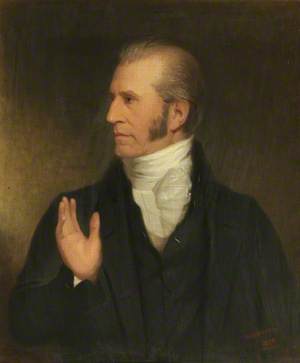William Newman (1773-1836)
Artist: George Henry Boughton (1883-1905)

William Newman was born in Enfield, Middlesex, on 10th May 1773, the only surviving child of Thomas and Mary Newman. His initial exposure to the faith came when he accompanied his mother to services run by the Baptist ministry, which had first arrived in Enfield in 1779. In his youth, he was ridiculed by schoolfellows for his dedicated pursuit of the faith, but was encouraged by his tutor, Mr Ryland, to preach the gospel. Baptised in 1792, and inducted into the ministry the following year, he began preaching as a minister first at Old Ford, Middlesex. Interested in education, he opened a seminary for young men in 1804.
Newman occasionally expressed doubts in his occupation, and recorded in his diary that at times he considered “giving up the ministry”. However, in 1811 he became the first principal of Regent’s Park College (at the time named Stepney College), London. He taught there for fifteen years until his resignation in 1826, after six years of tensions between himself and the students and other tutors of the College, predominantly on the grounds of Newman’s staunch conservative beliefs in monarchism and closed communion. Newman appeared very conservative in his views, so much so that he referred to those more lively students as “radicals”. Despite his less than ideal departure from the college, when he died on 22nd December 1835 he left the entirety of his valuable library to Stepney College. He appeared to have maintained a cordial relationship with the college in later life, and was commemorated warmly by the members in Stepney College’s Annual General Meeting the year after he died.
Newman was also an accomplished scholar, translating for the editor of Camden’s Britannica 500 pages of Latin as a boy, while his adult diary records his enjoyment of classical texts such as Virgil, Ovid and Xenophon, amongst many others. Of Ovid, he wrote: “It is not so corrupt as I expected. What an amazing imagination that man had.” Most curiously perhaps, the Angus Library at Regent’s Park College contains his personal copies of Mary Wollstonecraft, causing us to wonder what particular interest he had in these feminist texts.